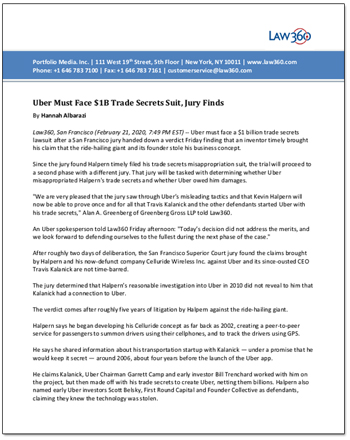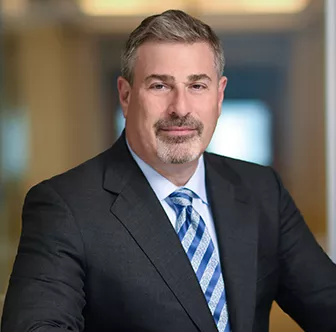BREAKING: Uber Must Face $1B Trade Secrets Suit, Jury Finds – Law360
 Law360
Law360
by Hannah Albarazi
February 21, 2020
Law360, San Francisco (February 21, 2020, 7:49 PM EST) — Uber must face a $1 billion trade secrets lawsuit after a San Francisco jury handed down a verdict Friday finding that an inventor timely brought his claim that the ride-hailing giant and its founder stole his business concept.
Since the jury found Halpern timely filed his trade secrets misappropriation suit, the trial will proceed to a second phase with a different jury. That jury will be tasked with determining whether Uber misappropriated Halpern’s trade secrets and whether Uber owed him damages.
“We are very pleased that the jury saw through Uber’s misleading tactics and that Kevin Halpern will now be able to prove once and for all that Travis Kalanick and the other defendants started Uber with his trade secrets,” Alan A. Greenberg of Greenberg Gross LLP told Law360.
An Uber spokesperson told Law360 Friday afternoon: “Today’s decision did not address the merits, and we look forward to defending ourselves to the fullest during the next phase of the case.”
After roughly two days of deliberation, the San Francisco Superior Court jury found the claims brought by Halpern and his now-defunct company Celluride Wireless Inc. against Uber and its since-ousted CEO Travis Kalanick are not time-barred.
The jury determined that Halpern’s reasonable investigation into Uber in 2010 did not reveal to him that Kalanick had a connection to Uber.
The verdict comes after roughly five years of litigation by Halpern against the ride-hailing giant.
Halpern says he began developing his Celluride concept as far back as 2002, creating a peer-to-peer service for passengers to summon drivers using their cellphones, and to track the drivers using GPS.
He says he shared information about his transportation startup with Kalanick — under a promise that he would keep it secret — around 2006, about four years before the launch of the Uber app.
He claims Kalanick, Uber Chairman Garrett Camp and early investor Bill Trenchard worked with him on the project, but then made off with his trade secrets to create Uber, netting them billions. Halpern also named early Uber investors Scott Belsky, First Round Capital and Founder Collective as defendants, claiming they knew the technology was stolen.
Conversely, Kalanick and Camp claim the development of Uber came when the two of them were in Paris and Camp came up with an idea for a “limo timeshare service.”
Halpern says he researched Uber online in 2010 but didn’t see any information connecting it to Kalanick. He said he only discovered the connection between Kalanick and Uber while reading a news article in 2012.
Halpern sued Uber in 2015 and has since gone through a string of attorneys.
Just one week before trial, the judge overseeing the case rejected a bid by Halpern’s counsel at Greenberg Gross LLP to withdraw from the case. The attorneys told the court in their request that the firm “is unable to further represent plaintiffs and cannot try the case.”
But the case went to trial on Feb. 7 in San Francisco.
In closing arguments Wednesday, Greenberg representing Halpern, told the jury that his clients’ misappropriation of trade secrets claims brought in March 2015 are not barred by the three-year statute of limitations and that Halpern should be allowed to bring his substantive claims to trial.
“It’s not like [Uber vehicles are] driving around with Kalanick’s face on the side of the car,” Greenberg told the jury.
Greenberg argued that Halpern didn’t discover the alleged trade secrets misappropriation earlier, nor could he reasonably have discovered it.
But counsel for San Francisco-based Uber told the jury it denies Halpern’s claim that Uber stole the concept from him.
Daralyn J. Durie of Durie Tangri LLP, co-counsel for Uber, told jurors during closing arguments that Uber and its founders received significant media coverage in 2010 and 2011 and that a reasonable person exercising reasonable diligence should have discovered Kalanick’s involvement with Uber long before late 2012, when Halpern says he discovered it.
Durie dug into Halpern’s changing statements regarding when he researched Uber, arguing that if Halpern researched Uber in the spring of 2010, as he testified to doing, a basic Internet search would have revealed that Uber — then known as Ubercab — listed Kalanick as part of its team.
But Halpern says by the “spring” of 2010 he actually meant February 2010 and that in February 2010 the Uber website didn’t yet list Kalanick as a team member.
Throughout the trial, Uber’s counsel provided the jury with evidence of Halpern’s past drama with his former counsel, since Halpern blames his former attorney — Christopher B. Dolan of The Dolan Law Firm — of losing his evidentiary emails.
Dolan, whose attorney-client privileges have been waived by Halpern, denies causing the loss of Halpern’s emails. The jury watched a video deposition of Dolan describing Halpern as “a megalomaniac” and a “very difficult person to deal with.”
Halpern has a “pattern of blaming his lawyers when things go wrong,” Durie told the jury.
But Greenberg slammed Durie’s closing arguments, describing them as “a lawyer smoke-and-mirror trick” and arguing that Halpern did not intentionally mean for his emails to be deleted.
Halpern is represented by Alan A. Greenberg, Wayne R. Gross, John W. Holcomb and Sarah Kelly-Kilgore of Greenberg Gross LLP.
Uber, Kalanick, Camp, Trenchard, Belsky, First Round Capital and Founder Collective are represented by Ragesh K. Tangri, Daralyn J. Durie, Raghav R. Krishnapriyan and Catherine Y. Kim of Durie Tangri LLP.
Kalanick is also represented by Walter F. Brown Jr., Melinda Haag, Colleen E. Popken and R. Rosie Gorn of Orrick Herrington & Sutcliffe LLP.
The case is Halpern et al. v. Uber Technologies Inc. et al., case number CGC15545825, in the Superior Court of the State of California, City and County of San Francisco.



